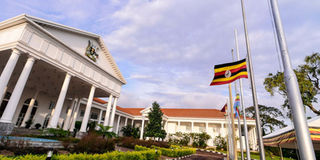Govt borrowing is not sustainable

Government is now borrowing another Shs6 trillion hardly four months into the new financial year. PHOTO/PPU
What you need to know:
- The issue: Govt borrowing
- Our view: Parliament should exercise its oversight role to prevent Cabinet from this reckless and extravagant borrowing that entrenches the country in perpetual domestic and external debt. Our national debt is already threatening to cross the red line.
Cabinet on Tuesday tabled before Parliament a request for Shs6 trillion loan to cover the Budget deficit hardly four months into the 2020/2021 financial year.
On the same day, Cabinet tabled a request for supplementary budget of Shs3.7 trillion, which was approved by Parliament. This will take the National Budget to Shs49 trillion, up from Shs45.5 trillion, which was approved by Parliament in July.
In the supplementary budget is Shs451b for State House, which is more than half of the original budget of Shs600b for the President’s residence alone.
This is hardly four months into the financial year and State House has already consumed Shs465b (three quarters) of the initial Shs600b and wants the same amount in new additional budget. One wonders how many more billions State House will ask for before the end of this financial next year.
In May, just a month to the end of Financial Year 2019/2020, government tabled loan requests for Shs1.8 trillion from IMF and Shs1.1 trillion from the World Bank, which were both approved.
Government is now borrowing another Shs6 trillion hardly four months into the new financial year.
Parliament should exercise its oversight role to prevent Cabinet from this reckless and extravagant borrowing that entrenches the country in perpetual domestic and external debt.
Our national debt is already threatening to cross the red line - half of GDP - and government is still borrowing for reasons that don’t seem to rebuild the stressed economy to recover from the Covid-19 impact.
Many schools have not reopened due to lack of money to install standard operating procedures (SOPs) or to pay staff and procure other required materials. Teachers lost jobs after the closure in March and many schools have closed shop. Those that have managed to reopened have no money to pay salaries and are paying teachers peanuts.
Private schools have appealed to government for financial bailout to be able to recover, but government said it has no money. Government has rejected even the request by schools to pay at least examination fees for all candidates in both private and public schools since parents lost jobs and are poor following the lockdown.
Now government is borrowing trillions of shillings to fund additional expenditure of State House, just the residence of the President and for defence when there is no imminent security threat in the country, yet it cannot find money to help the country’s children to sit their final exams due to lack of money.
How is this borrowing of help to Ugandans?




